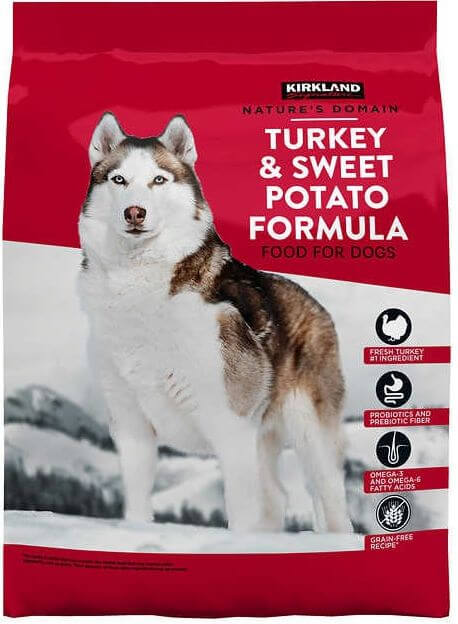
DogFoodAdvisor is reader supported See how
All reviews are 100% impartial but if you buy using links on this page, we may earn a referral fee.
Our Verdict
Kirkland Nature’s Domain dry product range is made up of six recipes with ratings varying from 4 to 5 stars. The average rating of the whole range is 4 stars.
The table below shows each recipe in this range including our rating and the AAFCO nutrient profile: Growth (puppy), Maintenance (adult), All Life Stages, Supplemental or Unspecified.
Recipe and Label Analysis
Nature’s Domain Turkey and Sweet Potato was selected to represent the other products in the line for detailed recipe and nutrient analysis.
Nature's Domain Turkey and Sweet Potato
Estimated Dry Matter Nutrient Content
Protein
Fat
CarbsCarbohydrates
Turkey, turkey meal, sweet potatoes, potatoes, peas, canola oil (preserved with mixed tocopherols), dried yeast, flaxseed, natural flavor, dried beet pulp, salmon oil (a source of DHA), dicalcium phosphate, salt, potassium chloride, DL-Methionine, choline chloride, taurine, blueberries, raspberries, tomatoes, dried chicory root, yucca schidigera extract, L-Carnitine, dried Lactobacillus plantarum fermentation product, dried Bacillus subtilis fermentation product, dried Lactobacillus acidophilus fermentation product, dried Enterococcus faecium fermentation product, dried Bifidobacterium animalis fermentation product, vitamin E supplement, iron proteinate, zinc proteinate, copper proteinate, ferrous sulfate, zinc sulfate, manganese sulfate, copper sulfate, potassium iodide, thiamine mononitrate, manganese proteinate, ascorbic acid (preservative), vitamin A supplement, biotin, niacin, calcium pantothenate, sodium selenite, pyridoxine hydrochloride, vitamin B12 supplement, riboflavin, vitamin D3 supplement, folic acid.
Fiber (estimated dry matter content) = 4%
Red denotes any controversial items
| Estimated Nutrient Content | |||
|---|---|---|---|
| Method | Protein | Fat | Carbs |
| Guaranteed Analysis | 24% | 14% | NA |
| Dry Matter Basis | 27% | 16% | 50% |
| Calorie Weighted Basis | 23% | 33% | 44% |
Ingredients Analysis
The first ingredient is turkey. Turkey is considered “the clean combination of flesh and skin… derived from the parts or whole carcasses of turkey”.1
Turkey is naturally rich in the 10 essential amino acids required by a dog to sustain life.
The second ingredient in this dog food is turkey meal. Turkey meal is considered a meat concentrate and contains nearly 300% more protein than fresh turkey.
The third ingredient is sweet potato. Sweet potatoes are a gluten-free source of complex carbohydrates in dog food. They are naturally rich in dietary fiber and beta carotene.
The fourth ingredient includes peas. Peas are a quality source of carbohydrates. And like all legumes, they’re rich in natural fiber.
However, peas contain about 25% protein, a factor that must be considered when judging the meat content of this dog food.
The fifth ingredient is potato. Potatoes can be considered a gluten-free source of digestible carbohydrates. Yet with the exception of perhaps their caloric content, potatoes are of only modest nutritional value to a dog.
The sixth ingredient is canola oil. Unfortunately, canola can be a controversial item. That’s because it can sometimes (but not always) be derived from genetically modified rapeseed.
Yet others cite the fact that canola oil can be a significant source of essential omega-3 fatty acids.
In any case, plant-based oils like canola are less biologically available to a dog than fish oil as a source of quality omega-3 fats.
The seventh ingredient is dried yeast, which can be a controversial item. Dried yeast contains about 45% protein and is rich in other healthy nutrients. Fans believe yeast repels fleas and supports the immune system. Critics argue yeast ingredients can be linked to allergies.
This may be true, but (like all allergies) only if your particular dog is allergic to the yeast itself. What’s more, a vocal minority insist yeast can increase the risk of developing the life-threatening condition known as bloat. However, this is something we’ve not been able to scientifically verify.
In any case, unless your dog is specifically allergic to it, we feel yeast should be considered a nutritious addition.
The eighth ingredient is flaxseed, one of the best plant sources of healthy omega-3 fatty acids. Provided they’ve first been ground into a meal, flax seeds are also rich in soluble fiber.
However, flaxseed contains about 19% protein, a factor that must be considered when judging the actual meat content of this dog food.
After the natural flavor, we find salmon oil, which is naturally rich in the prized EPA and DHA type of omega-3 fatty acids. These two high quality fats boast the highest bio-availability to dogs and humans.
Depending on its level of freshness and purity, salmon oil should be considered a commendable addition.
From here, the list goes on to include a number of other items.
But to be realistic, ingredients located this far down the list (other than nutritional supplements) are not likely to affect the overall rating of this Kirkland product.
With four notable exceptions…
First, chicory root is rich in inulin, a starch-like compound made up of repeating units of carbohydrates and found in certain roots and tubers.
Not only is inulin a natural source of soluble dietary fiber, it’s also a prebiotic used to promote the growth of healthy bacteria in a dog’s digestive tract.
Next, this recipe contains sodium selenite, a controversial form of the mineral selenium. Sodium selenite appears to be nutritionally inferior to the more natural source of selenium found in selenium yeast.
We note the inclusion of dried fermentation products in this recipe. Fermentation products are typically added as probiotics to aid with digestion.
And lastly, this food includes chelated minerals, minerals that have been chemically attached to protein. This makes them easier to absorb. Chelated minerals are usually found in better dog foods.
Nutrient Analysis
Based on its ingredients alone, Kirkland Signature Nature’s Domain Dog Food looks like an above-average dry product.
The dashboard displays a dry matter protein reading of 26.7%, a fat level of 15.6% and estimated carbohydrates of about 49.8%.
As a group, the brand features an average protein content of 28.5% and a mean fat level of 16.3%. Together, these figures suggest a carbohydrate content of 47.2% for the overall product line.
And a fat-to-protein ratio of about 57%.
Near-average protein. Near-average fat. And near-average carbs when compared to a typical dry dog food.
Even when you consider the protein-boosting effect of the peas and flaxseed in this recipe, and the legumes contained in other recipes, this still looks like the profile of a dry dog food containing a notable amount of meat.
Kirkland Dog Food Recall History
The following automated list (if present) includes all dog food recalls related to Kirkland through April 2025.
You can view a complete list of all dog food recalls since 2009 here.
Our Rating of Kirkland Grain Free and Grain Inclusive Dog Food
Kirkland Signature Nature’s Domain is a grain-free and grain-inclusive dry dog food using a notable amount of named meat meals as its dominant source of animal protein, thus earning the brand 4 stars.
Compare Kirkland Dog Food
How does Kirkland compare with The Dog Food Advisor's most recommended brands?
Sources
A Final Word
The Dog Food Advisor does not accept money, gifts, samples or other incentives in exchange for special consideration in preparing our reviews.
However, we do receive a referral fee from online retailers (like Chewy or Amazon) and from sellers of perishable pet food when readers click over to their websites from ours. This helps cover the cost of operation of our free blog. Thanks for your support.
For more information, please visit our Disclaimer and Disclosure page.








